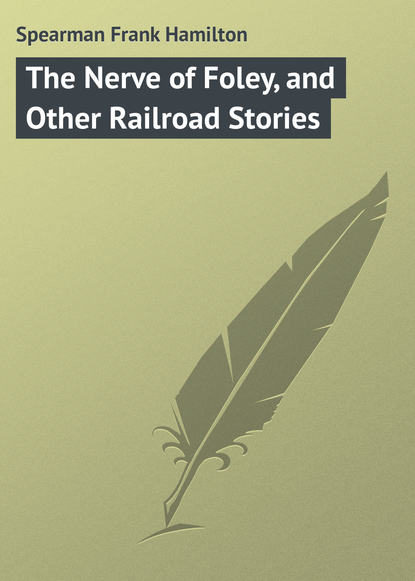По всем вопросам обращайтесь на: info@litportal.ru
(©) 2003-2024.
✖
The Nerve of Foley, and Other Railroad Stories
Настройки чтения
Размер шрифта
Высота строк
Поля
"Who's pulling Second Seventy-Seven?" he cried.
"Andy Cameron."
"How many air cars has he got?"
"Six or eight," shouted Ben. "It's the wind, Daley – the wind. Andy can hold her if anybody can. But the wind; did you ever see such a blow?"
Even while he spoke the cry for brakes came a third time on the storm.
A frightened Pullman porter opened the rear door of the sleeper. Five hundred people lay in the excursion train, unconscious of this avalanche rolling down upon them.
The conductor of the flyer ran up to Ben in a panic.
"Buckley, they'll telescope us."
"Can you pull ahead any?"
"The bridge is out."
"Get out your passengers," said Ben's brakeman.
"There's no time," cried the passenger conductor, wildly, running off. He was panic-stricken. The porter tried to speak. He took hold of the brakeman's arm, but his voice died in his throat; fear paralyzed him. Down the wind came Cameron's whistle clamoring now in alarm. It meant the worst, and Ben knew it. The stock-train was running away.
There were plenty of things to do if there was only time; but there was hardly time to think. The passenger crew were running about like men distracted, trying to get the sleeping travellers out. Ben knew they could not possibly reach a tenth of them. In the thought of what it meant, an inspiration came like a flash.
He seized his brakeman by the shoulder. For two weeks the man carried the marks of his hand.
"Daley!" he cried, in a voice like a pistol crack, "get those two stockmen out of our caboose. Quick, man! I'm going to throw Cameron into the cattle."
It was a chance – single, desperate, but yet a chance – the only chance that offered to save the helpless passengers in his charge.
If he could reach the siding switch ahead of the runaway train, he could throw the deadly catapult on the siding and into his own train, and so save the unconscious travellers. Before the words were out of his mouth he started up the track at topmost speed.
The angry wind staggered him. It blew out his lantern, but he flung it away, for he could throw the switch in the dark. A sharp gust tore half his rain-coat from his back; ripping off the rest, he ran on. When the wind took his breath he turned his back and fought for another. Blinding sheets of rain poured on him; water streaming down the track caught his feet; a slivered tie tripped him, and, falling headlong, the sharp ballast cut his wrists and knees like broken glass. In desperate haste he dashed ahead again; the headlight loomed before him like a mountain of flame. There was light enough now through the sheets of rain that swept down on him, and there ahead, the train almost on it, was the switch.
Could he make it?
A cry from the sleeping children rose in his heart. Another breath, an instant floundering, a slipping leap, and he had it. He pushed the key into the lock, threw the switch and snapped it, and, to make deadly sure, braced himself against the target-rod. Then he looked.
No whistling now; it was past that. He knew the fireman would have jumped. Cameron too? No, not Andy, not if the pit yawned in front of his pilot.
He saw streams of fire flying from many wheels – he felt the glare of a dazzling light – and with a rattling crash the ponies shot into the switch. The bar in his hands rattled as if it would jump from the socket, and, lurching frightfully, the monster took the siding. A flare of lightning lit the cab as it shot past, and he saw Cameron leaning from the cab window, with face of stone, his eyes riveted on the gigantic drivers that threw a sheet of fire from the sanded rails.
"Jump!" screamed Ben, useless as he knew it was. What voice could live in that hell of noise? What man escape from that cab now?
One, two, three, four cars pounded over the split rails in half as many seconds. Ben, running dizzily for life to the right, heard above the roar of the storm and screech of the sliding wheels a ripping, tearing crash, the harsh scrape of escaping steam, the hoarse cries of the wounded cattle. And through the dreadful dark and the fury of the babel the wind howled in a gale and the heavens poured a flood.
Trembling from excitement and exhaustion, Ben staggered down the main track. A man with a lantern ran against him; it was the brakeman who had been back with the torpedoes; he was crying hysterically.
They stumbled over a body. Seizing the lantern, Ben turned the prostrate man over and wiped the mud from his face. Then he held the lantern close, and gave a great cry. It was Andy Cameron – unconscious, true, but soon very much alive, and no worse than badly bruised. How the good God who watches over plucky engineers had thrown him out from the horrible wreckage only He knew. But there Andy lay; and with a lighter heart Ben headed a wrecking crew to begin the task of searching for any who might by fatal chance have been caught in the crash.
And while the trainmen of the freights worked at the wreck the passenger-train was backed slowly – so slowly and so smoothly – up over the switch and past, over the hill and past, and so to Turner Junction, and around by Oxford to Zanesville.
When the sun rose the earth glowed in the freshness of its June shower-bath. The flyer, now many miles from Beverly Hill, was speeding in towards Omaha, and mothers waking their little ones in the berths told them how close death had passed while they slept. The little girls did not quite understand it, though they tried very hard, and were very grateful to That Man, whom they never saw and whom they would never see. But the little boys – never mind the little boys – they understood it, to the youngest urchin on the train, and fifty times their papas had to tell them how far Ben ran and how fast to save their lives. And one little boy – I wish I knew his name – went with his papa to the depot-master at Omaha when the flyer stopped, and gave him his toy watch, and asked him please to give it to That Man who had saved his mamma's life by running so far in the rain, and please to tell him how much obliged he was – if he would be so kind.
So the little toy watch came to our superintendent, and so to me; and I, sitting at Cameron's bedside, talking the wreck over with Ben, gave it to him; and the big fellow looked as pleased as if it had been a jewelled chronometer; indeed, that was the only medal Ben got.
The truth is we had no gold medals to distribute out on the West End in those days. We gave Ben the best we had, and that was a passenger run. But he is a great fellow among the railroad men. And on stormy nights switchmen in the Zanesville yards, smoking in their shanties, still tell of that night, that storm, and how Ben Buckley threw Second Seventy-Seven at the foot of Beverly Hill.
The Kid Engineer
When the big strike caught us at Zanesville we had one hundred and eighty engineers and firemen on the pay-roll. One hundred and seventy-nine of these men walked out. One fireman – just one – stayed with the company; that was Dad Hamilton.
"Yes," growled Dad, combating the protests of the strikers' committee, "I know it. I belong to your lodge. But I'll tell you now – an' I've told you afore – I ain't goin' to strike on the company so long as Neighbor is master-mechanic on this division. Ain't a-goin' to do it, an' you might as well quit. 'F you jaw here from now till Christmas 'twon't change my mind nar a bit."
And they didn't change it. Through the calm and through the storm – and it stormed hard for a while – Dad Hamilton, whenever we could supply him with an engineer, fired religiously.
No other man in the service could have done it without getting killed; but Dad was old enough to father any man among the strikers. Moreover, he was a giant physically, and eccentric enough to move along through the heat of the crisis indifferent to the abuse of the other men. His gray hairs and his tremendous physical strength saved him from personal violence.
Our master-mechanic, "Neighbor," was another big man – six feet an inch in his stockings, and strong as a draw-bar. Between Neighbor and the old fireman there existed some sort of a bond – a liking, an affinity. Dad Hamilton had fired on our division ten years. There was no promotion for Dad; he could never be an engineer, though only Neighbor knew why. But his job of firing on the river division was sure as long as Neighbor signed the pay-rolls at the round-house.
Hence there was no surprise when the superintendent offered him an engine, just after the strike, that Dad refused to take it.
"I'm a fireman, and Neighbor knows it. I ain't no engineer. I'll make steam for any man you put in the cab with me, but I won't touch a throttle for no man. I laid it down, and I'll never pinch it again – an' no offence t' you, Neighbor, neither."
Thus ended negotiations with Dad on that subject; threats and entreaties were useless. Then, too, in spite of his professed willingness to throw coal for any man we put on his engine, he was continually rowing about the green runners we gave him. From the standpoint of a railroad man they were a tough assortment; for a fellow may be a good painter, or a handy man with a jack-plane, or an expert machinist, even, and yet a failure as an engine-runner.
After we got hold of Foley, Neighbor put him on awhile with Dad, and the grizzled fireman quickly declared that Foley was the only man on the pay-roll who knew how to move a train.
The little chap proved such a remarkable find that I tried hard to get some of his Eastern chums to come out and join him. After a good bit of hustling we did get half a dozen more Reading boys for our new corps of engine-men, but the East-End officials kept all but one of them on their own divisions. That one we got because nobody on the East End wanted him.
"They've crimped the whole bunch, Foley," said I, answering his inquiries. "There's just one fellow reported here – he came in on 5 this morning. Neighbor's had a little talk with him; but he doesn't think much of him. I guess we're out the transportation on that fellow."
"What's his name?" asked Foley. "Is he off the Reading?"
"Claims he is; his name is McNeal – "
"McNeal?" echoed Foley, surprised. "Not Georgie McNeal?"
"I don't know what his first name is; he's nothing but a boy."
"Dark-complexioned fellow?"
"Perhaps you'd call him that; sort of soft-spoken."
"Georgie McNeal, sure's you're born. If you've got him you've got a bird. He ran opposite me between New York and Philadelphia on the limited. I want to see him, right off. If it's Georgie, you're all right."
Foley's talk went a good ways with me any time. When I told Neighbor about it he pricked up his ears. While we were debating, in rushed Foley with the young fellow – the kid – as he called him. Neighbor made another survey of the ground in short order: run a new line, as Foley would have said. The upshot of it was that McNeal was assigned to an engine straightway.










